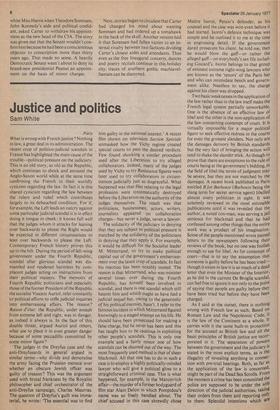Justice and politics
Sam White
Paris What is wrong with French justice? Nothing in law, a great deal in its administration. The recent crop of politico-judicial scandals in France has highlighted the main cause of the trouble—political pressure on the judiciary. This is an old story, as old as the Republic, which continues to shock and astound the Anglo-Saxon world while at the same time confirming the French in their worldly cynicism regarding the law. In fact it is this shared cynicism regarding the law between the rulers and ruled which contributes largely to its debauched condition. For if, for example, the Left leads an outcry against sonic particular judicial scandal it is in effect doing it tongue in cheek : it knows full well that the judges whom it attacks for leaning over backwards to please the Right would be expected in different circumstances to lean over backwards to please the Left. Contemporary French history proves this up to the hilt. During the period of left-wing government under the Fourth Republic, scandal after glorious scandal was dismantled and rendered harmless by complacent judges acting on instructions from their political masters. The memoirs of Fourth Republic politicians and especially those of the former President of the Republic the socialist Vincent A uriol, refer constantly to political efforts to stifle judicial inquiries into embarrassing affairs. The reason ? Raison d'etat: the Republic, under assault from extreme left and right, was in danger, as indeed it always is. In the face of this double threat, argued Auriol and others, what use to place it in even greater danger because of some peccadillo committed by some minor figure?
The judges in the Dreyfus case and the anti-Dreyfusards in general argued in similar terms—why divide and demoralise the army facing the Prussian menace over whether an obscure Jewish officer was guilty of treason? This was the argument used with brutal frankness by the Royalist philosopher and chief orchestrator of the anti-Dreyfus campaign, Charles Maurras. The question of Dreyfus's guilt was immaterial, he wrote: 'The essential was to find him guilty in the national interest.' A recent film shown on television Section Speciale unmasked how the Vichy regime created special courts to pass the desired verdicts. Few found shocking a similar procedure used after the Liberation to try alleged collaborators. Indeed, many of the judges used by Vichy to try Resistance figures were later used to try collaborators in circumstances judicially just as disgraceful. What happened was that files relating to the legal profession were systematically destroyed before the Liberation on the authority of the judges themselves. The result was that politicians, businessmen, actors, writers, journalists appeared on collaboration charges—but never a judge, never a lawyer.
The solidarity of the judiciary in denying that they are subject to political pressure is matched by the solidarity of the politicians in denying that they apply it. For example, it would be difficult for the Socialist leader M. Mitterrand, to try to make political capital out of the government's embarrassment over the latest crop of scandals. In fact his reaction has been notably muted. The reason is that Mitterrand, who was minister several times over during the Fourth Republic, has himself been involved in scandal, and there is one scandal which still haunts him and which ought to have had a judicial sequel but, owing to the generosity of his political enemies, hasn't. I refer to the famous incident in which Mitterrand figured knowingly in a staged attempt on his life. He should have been prosecuted for making a false charge, but he never has been and this has taught him to be cautious in exploiting other people's scandals. This is only one example and a fairly minor one of how scandals can be shunted out of the way. The most frequently used method is that of sheer blackmail. All that one has to do in such a case is to employ a highly politically-minded lawyer who will give a political gloss to a straightforward criminal case. This is what happened, for example, in the Marcovitch affair—the murder of a former bodyguard of film star Alain Delon in which Pompidou's name was so freely bandied about. The chief accused in this case shrewdly chose Maitre Isorni, Petain's defender, as his counsel and the ,case was won even before it had started. lsorni's defence technique was simple and he outlined it to me at the time in engrossing detail. If the government dared prosecute his client, he told me, then he would blow the gaff—or rather the alleged gaff—on everybody's sex life including Giscard's. Isorni belongs to that group of eminent extreme right-wing lawyers who are known as the 'tenors' of the Paris bar and who can intimidate bench and government alike. Needless to say, the charge against his client was dropped.
Two basic weaknesses in the application of the law rather than in the law itself make the French legal system partially unworkable. One is the absence of an effective law of libel and the other is the non-application of the law concerning contempt of court. It is virtually impossible for a major political figure to seek effective redress in the courts for even the grossest slanders. Not only are the damages derisory by British standards but the very fact of bringing the action will tend to rhake the slander stick. As though to prove that there are exceptions to the rule of courts being at the government's bidding, in the'field of libel the terms of judgment may be severe, but they are not matched by the damages. A recent book published in Paris entitled BlOr Barbouze (Barboure being the slang term for secret service agent) libelled almost every politician in sight. It was solemnly reviewed in the most estimable publications until it was revealed that the author, a noted con-man, was serving a jail sentence for blackmail and that he had confessed among other things that the entire work was a product of his imagination. Some of the people mentioned wrote pained letters to the newspapers following their reviews of the book, but no one was foolish enough to sue for libel. As for contempt of court—that is to say the assumption that someone is guilty before he has been triedthough it exists in law it is so much of a dead letter that even the Minister of the Interior, as he did in the current De Broglie scandal, can feel free to ignore it not only to the point of saying that people are guilty before they have been tried but before they have been charged.
As I said at the outset, there is nothing wrong with French law as such. Based on Roman Law and the Napoleonic Code, it is the law of the Continent as a whole. It carries with it the same built-in protection for the accused as British law and all the basic principles of British justice are incorporated in it. The separation of powers between the government and the judiciary is stated in the most explicit terms, as is the illegality of revealing anything in connection with pre-trial hearings. Both, as far as the application of the law is concerned, might be part of the Dead Sea Scrolls. From the moment a crime has been committed the police are supposed to be under the sole direction of the judicial authorities, taking their orders from them and reporting ontY to them. Splendid intentions which are
seldom applied. In the notorious Ben Barka affair, the fact that two policemen took part in the kidnapping of the Moroccan opposition leader was revealed to the examining magistrate a full two months after they had confessed to their police superiors.
Matters have now reached such a point that not only is the law not applied, but it is oPenly broken in an unprecedentedly brazen fashion by the government itself. Take the De Broglie affair again: how can one explain that the Minister of the Interior can hold a press conference to declare freshly detained suspects guilty and make his Intentions clear twenty-four hours before Without his colleague, the Minister of Justice, warning him that he would be in oPen breach of the law if' he did so? Only by a still further drop in already debased Judicial standards. Or take the dangerous precedent set in the verdict on the Canard Enchaine bugging case. You cannot charge the police with breaking and entering because the Canard had not yet moved into Us new editorial premises and you cannot Charge them with violation of privacy because a newspaper office is not a domestic dwelling. It took the examining magistrate three years to come up with this verdict and there are no prizes offered as to who might have helped him with his homework. Or the Abu Daoud case, where the Appeals Court Was hastily summoned five days before it was due to sit, where the Public Prosecutor did not bother to prosecute, and where the
terms of the Franco-German extradition treaty were blandly ignored.
Let this be said, however—the methods used for transmitting orders from the government to the judiciary are not necessarily crude. Cajolery, flattery and delicate hints concerning higher posts that are falling vacant are the usual methods for getting the desired verdict rather than outright bullying. The point can be simply made by noting that all judicial careers are dependent on the Conseil Superieur de la Magistrature consisting of nine senior judges all named by the President of the Republic.
What to do about it poses enormous problems, for as I have pointed out, the evil is deeply ingrained and goes back to the earliest days of the Republic. One can even sympathise with the judiciary who have had to face a series of bewildering changes in regimes and constitutions. The war alone produced an abrupt transfer from one 'legitimacy' to another and the same judges had to carry out both the Vichy purges and the Liberation ones. Then came the traumatic experience of the Algerian War, with again yesterday's heroes becoming the next day's villains. However, these events are now receding into the past and there is further encouragement to be gained fromthe fact that an entire generation of highly politicised lawyers, most on the extreme Right, is dying out. They matched their political zeal for vengeance on the regime with a lack of scruple which would have had
them disbarred in any other democratic country. Afraid of them and afraid of an independent judiciary, successive governments have shrunk from any action to clean up the French judicial system. It may be now dawning on the government that it has more to fear from docile judges than from independent ones. In that case, the French legal system offers a worthy target for Giscard's reforming zeal. For as it is, it poisons French life and gives a lamentable image of France abroad.











































 Previous page
Previous page